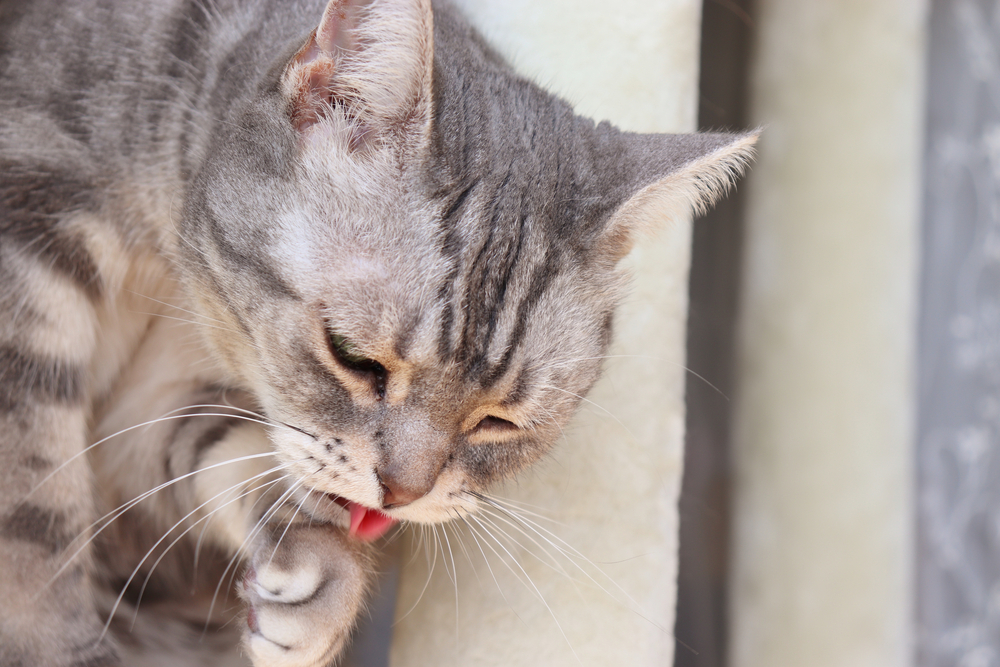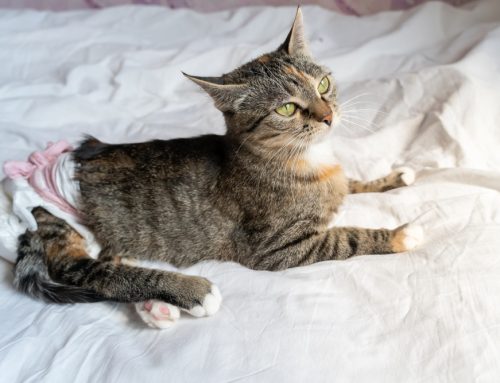Puke Patrol: What Is Really Causing Your Cat’s Upset Stomach?
Heartland Veterinary Hospital | Danville, Kentucky
One minute your cat lounges peacefully, and the next you are sprinting for paper towels and hoping they don’t choose your bed as the target for their upset stomach.
While the occasional hairball may be expected, repeated or sudden vomiting is never normal and can point to anything from dietary indiscretion to serious disease. Because cats are experts at masking illness, even subtle changes- like vomiting, hiding after meals, or skipping food- deserve attention. The doctors at Heartland Veterinary Hospital help families decode vomiting episodes so cats receive care before a small stomach upset turns into a serious medical problem.
Understanding Vomiting: What Is Normal and What Is Not
Vomiting in cats is an active, heaving effort that expels material from the stomach or upper intestines, while regurgitation is passive and usually happens shortly after eating. Knowing which one you are seeing guides urgency and the diagnostic plan. The appearance of the material also matters, since different types of cat vomit can indicate very different causes, from bile and foam to food and hair.
Vomiting may be acute, appearing suddenly after a trigger such as a diet change, or chronic, recurring over weeks due to underlying disease. Even a single episode signals irritation, but repeated events are never normal and always deserve evaluation.
Why Do Cats Vomit? Key Causes to Know
Dietary factors
Cats that gulp food often “scarf and barf.” Abrupt food changes, irregular meal timing, or rich table scraps disrupt stomach acid and gut bacteria. Gradual diet transitions and consistent pet food safety practices reduce the chance of stomach upset.
Hairballs
Most cats can pass ingested hair, yet heavy shedding or stress-related overgrooming increases the hair load. Repeated hairball vomiting inflames the stomach and, in some cases, forms a dense trichobezoar that can obstruct the outflow from the stomach.
Gastrointestinal obstruction
String, rubber bands, and toy parts can lodge in the stomach or intestines and block the passage of food. A gastrointestinal foreign body causes pain, repeated vomiting, and rapid deterioration, and it requires emergency removal. If you suspect an obstruction, our 24/7 emergency team is ready to help.
Toxins
Lilies, human pain medications, cleaning agents, and essential oils are common hazards. Use the poison control resource for household risks and the toxic and non-toxic plants list to cat-proof your home.
Chronic health conditions
- Chronic kidney disease. Toxin buildup from declining kidney function triggers nausea and vomiting. Signs of chronic kidney disease in cats often appear gradually, which is why routine screening is important.
- Hyperthyroidism. Excess thyroid hormone speeds metabolism and increases stomach acid, so cats lose weight despite a good appetite and may vomit regularly. Diagnosis and treatment follow the AAHA guidelines for feline hyperthyroidism.
- Pancreatitis. Inflammation of the pancreas causes abdominal pain, nausea, and vomiting, and many cases are subtle at first. Recognizing pancreatitis in pets early allows more effective care.
- Inflammatory bowel disease. Immune-mediated inflammation of the intestinal lining leads to chronic vomiting, diarrhea, and weight loss, often in cycles.
- Hepatic lipidosis. Early feeding support helps prevent hepatic lipidosis, especially in overweight cats that stop eating for forty-eight hours.
When Vomiting Is an Emergency
Seek veterinary care right away if your cat:
- vomits more than once in twenty-four hours,
- brings up blood or “coffee-ground” material,
- refuses meals or water,
- cries, hides, or resists being touched,
- shows weight loss, lethargy, or signs of dehydration.
Behavior changes often appear first. Reviewing the early indicators of lethargy in cats helps you identify trouble before a crisis. If it is an emergency- we’re here for you.
How Heartland Veterinary Hospital Can Help
Our approach focuses on fast relief and clear answers. We begin with a detailed history covering diet, speed of eating, access to plants or string, medication exposure, and recent stresses, then perform a nose-to-tail examination. Based on those findings, we build a stepwise plan:
- Same-day testing. Blood chemistry, complete blood count, thyroid levels, electrolytes, and urinalysis are run in our in-house laboratory to evaluate organ function, hydration, and infection. A urine specific gravity helps characterize kidney function, while electrolyte shifts point to the severity of vomiting.
- Fecal analysis. Microscopy and antigen tests screen for common parasites and infectious agents that can be missed on visual inspection.
- Imaging. Abdominal X-rays check for foreign objects, abnormal gas patterns, and masses. Ultrasound evaluates stomach and intestinal wall thickness, pancreas and liver texture, and free fluid. When needed, contrast studies clarify partial obstructions that are not obvious on a single image.
- Focused disease testing. Pancreatic lipase assays help confirm pancreatitis, cobalamin and folate levels assess malabsorption, and blood pressure screening supports the kidney and thyroid workup.
- Endoscopy or surgery. Minimally invasive endoscopy allows retrieval of small foreign objects and collection of biopsies for IBD or chronic gastritis. If a linear object is suspected or the intestine is compromised, our surgical services provide definitive treatment.
- Stabilization and symptom control. Cats that are nauseous or dehydrated receive anti-nausea medication, gastroprotectants, and intravenous fluids to restore comfort and correct electrolyte imbalances while we continue diagnostics.
- Long-term management. Chronic problems are managed with prescription nutrition, targeted medication, and rechecks coordinated through our hospital services and internal medicine care, with clear instructions for monitoring at home.
Our goal is to combine rapid stabilization with precise diagnosis so treatment addresses the real cause, not just the symptom.
Treatment That Fits the Cause
- Fluids and electrolytes correct dehydration and support kidney perfusion.
- Antiemetics and gastroprotectants reduce nausea and protect the stomach lining.
- Antiparasitics or antibiotics are used when a specific infectious agent is identified.
- Prescription diets support kidney disease, pancreatitis, food sensitivities, or IBD and are introduced gradually to prevent setbacks.
- Hormone therapy or radioactive iodine treats hyperthyroidism after baseline stabilization.
- Foreign body removal is performed promptly, using endoscopy when possible and surgery when necessary, followed by pain control and careful feeding plans.
- Rehabilitation modalities such as laser therapy can ease inflammation and support recovery in selected cases.
Home Care and Prevention
- Offer smaller, more frequent meals, or use puzzle feeders to slow rapid eaters.
- Transition to new diets over 7 to 10 days to protect the gut microbiome.
- Brush long-haired cats regularly and use hairball remedies as directed by your veterinarian.
- Store thread, cords, and small toys after play, and keep medications and cleaners secured.
- Provide multiple water stations and consider a fountain to encourage hydration.
- Reduce stress with predictable routines, vertical spaces, and quiet retreats.
- Track vomiting episodes in a journal, noting time, food, appearance, and any stresses; patterns help tailor diagnostics and treatment.

Frequently Asked Questions
Is an occasional hairball normal? One hairball every few weeks can be expected, but frequent vomiting should never be dismissed.
Should I withhold food after vomiting? Short fasting may help some healthy adults, yet kittens, seniors, and cats with chronic illness should not skip meals without veterinary guidance.
How can I tell if my cat is dehydrated? Dry gums, sunken eyes, and poor skin elasticity indicate dehydration and require prompt care.
What if the vomiting seems mild but keeps happening? Recurrent vomiting often reflects chronic disease. Early testing is safer and more effective than waiting for a crisis.
We Are Here to Help Your Cat Feel Better
Vomiting may seem routine, but it always has an underlying cause- and the sooner it’s addressed, the better your cat’s outcome. Whether the culprit is a simple dietary upset or a more complex medical condition, our team can pinpoint the problem and provide the right treatment plan. If your cat is vomiting often, refusing meals, or just not acting like themselves, call Heartland Veterinary Hospital or schedule an appointment to get answers.
For emergencies such as repeated vomiting, blood in the vomit, or sudden lethargy, our emergency team is available 24/7. We’re here to restore your cat’s comfort, safeguard their long-term health, and give you peace of mind knowing help is only a phone call away.








Leave A Comment